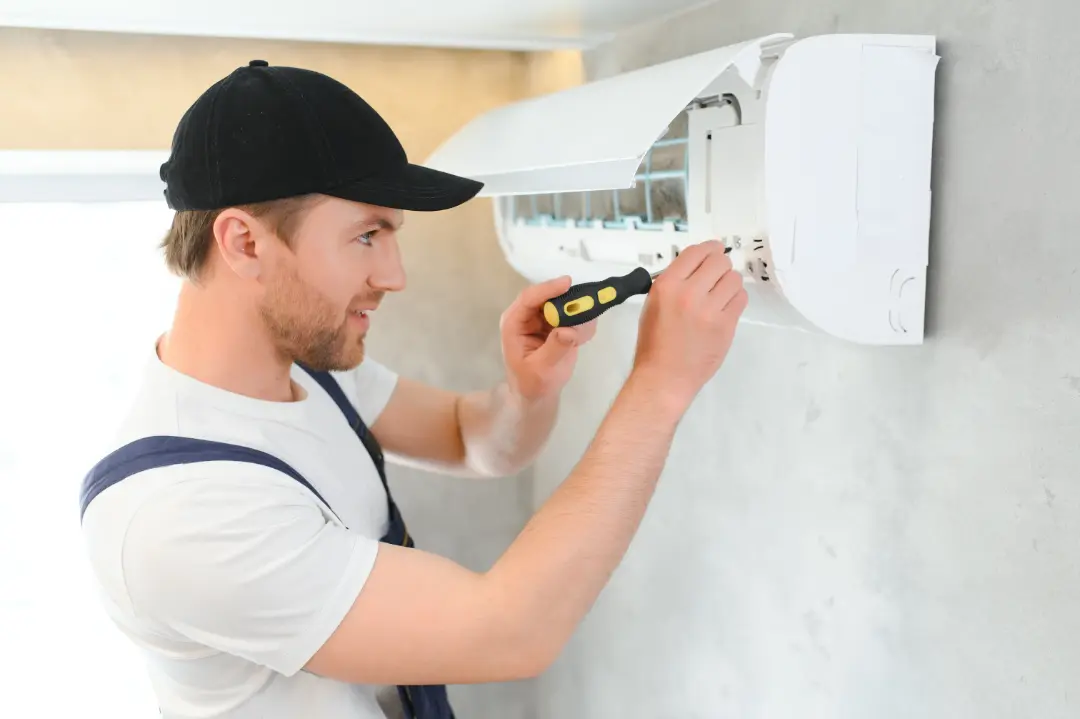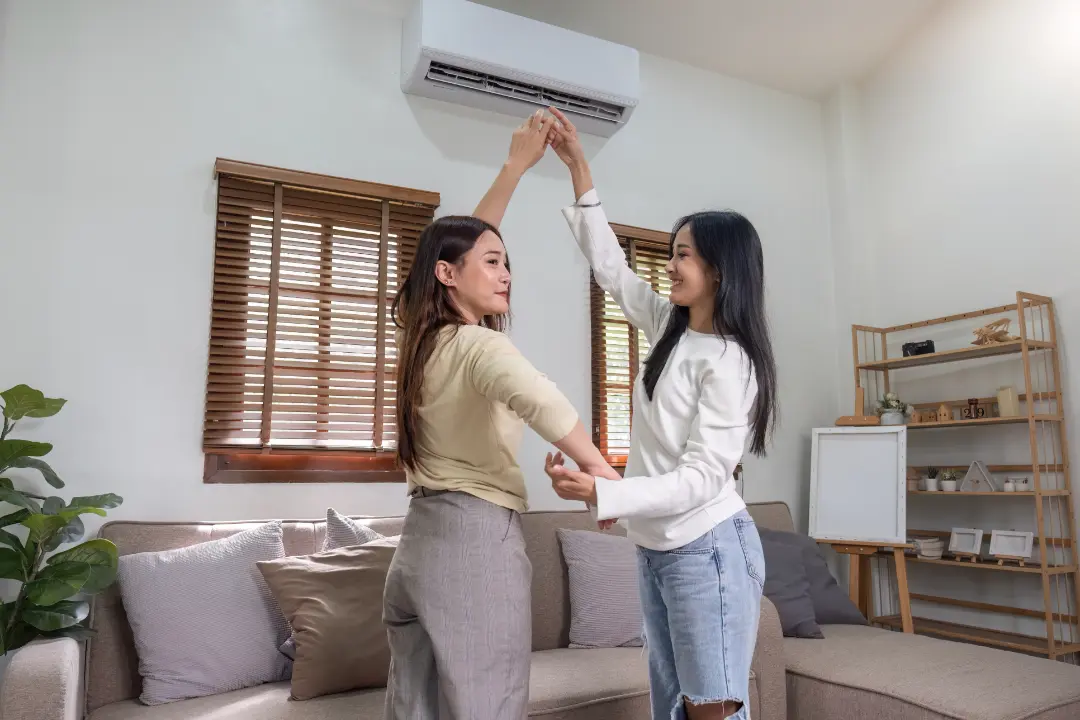It’s common for people looking to improve indoor air quality to wonder if air conditioners can purify the air. While air conditioners have basic filtration mechanisms that remove certain airborne particles, their effectiveness as air purifiers is limited. Air conditioners primarily work by using components like the evaporator coil, compressor, and condenser to transform refrigerant and cool the air within a central air conditioning system.
Contrary to popular belief, air conditioners do not bring outdoor air inside but instead recycle the air already present in the home. This article explores the air purification capabilities of air conditioners and how they compare to dedicated air purifiers.
Key Takeaways
- Air conditioners can filter common pollutants like dust and pollen through their air filters, but they are less effective against smoke, mould spores, germs, and VOCs than dedicated air purifiers equipped with HEPA filters.
- While air conditioners help filter and control humidity levels to improve indoor air quality, standalone air purifiers with technologies like HEPA filters, carbon filters, UV light, and ozone technology offer a higher level of purification.
- Regular maintenance of air conditioners, including air filter replacement and duct cleaning, is essential for maintaining air quality and system efficiency.
Air Purification Capabilities of Air Conditioners
Air conditioners do more than just cool your space; they also filter out common pollutants such as dust, pollen, and smoke, which helps improve indoor air quality. Despite this, air conditioners are often mistaken for devices that purify air. The filters within HVAC systems can capture dust, pollen, and allergens, but the air conditioner itself does not purify air. It’s the air filters that remove these particles.
Air conditioning also improves indoor air quality by controlling humidity and reducing allergens, especially during summer when usage is high. However, it’s important to note that their primary function isn’t as comprehensive as that of dedicated air purifiers, particularly those equipped with High-Efficiency Particle Air (HEPA) filters. While air conditioners are not ineffective, they serve a different primary purpose.
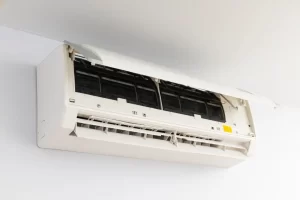
Understanding Your Air Conditioner’s Filtration System
The air filter in your air conditioner is a key component that not only helps keep your home cool but also ensures healthier air quality. Air filters work as part of a larger HVAC system that includes other components aimed at enhancing indoor air quality, such as humidifiers and air purifiers.
When the air is drawn into the system, the filter acts as a barrier by capturing dust, pollen, pet dander, and other allergens before they can circulate throughout your living space. This process can significantly improve comfort, particularly for individuals with allergies or respiratory issues.
Types of Air Conditioner Filters
Different types of air conditioner filters offer varying levels of filtration efficiency. Here’s a breakdown of the most common types:
- Fibreglass Filters: These are the most basic and affordable option. They trap large particles like dust and debris but are not very effective for smaller allergens. They need frequent replacements, typically every month or two.
- Pleated Filters: These filters have a pleated design that increases their surface area, allowing them to capture smaller particles than fibreglass filters. They offer a good balance between efficiency and cost-effectiveness, making them a popular choice for homeowners. Replacement is usually needed every 2-3 months.
- High-Efficiency Particulate Air (HEPA) Filters: If superior filtration is your priority, HEPA filters are the way to go. They can trap up to 99.97% of airborne particles down to 0.3 microns, making them ideal for those with severe allergies or asthma.
SmartWay Air Conditioning: The Trusted and Reliable Choice for Optimal Air Conditioning in Sydney
SmartWay Air Conditioning is a trustworthy service provider based in Sydney, Australia, offering expert AC installation, maintenance, cleaning, and repair services. With over 30 years of experience in the air conditioning industry, we are renowned for providing high-quality services and prioritising customer satisfaction.
We specialise in handling a variety of air conditioning systems, ensuring they function optimally and efficiently to promote better air quality. If you’re looking for reliable and professional services to keep your air conditioner in top condition, contact us today to schedule an appointment. Request a quote today and experience the difference in air quality with SmartWay Air Conditioning.
The Limitations of Air Conditioning as an Air Purifying Solution
While air conditioners are vital in maintaining comfortable indoor temperatures, they are not designed to purify the air comprehensively. If not maintained properly, air conditioning units can worsen indoor air quality by recirculating stale air and trapping contaminants. Here’s why air conditioners should not be relied upon as a complete air purification solution:
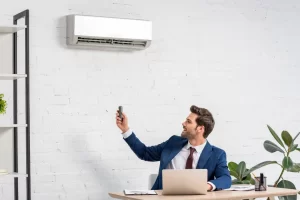
Limited Filtration Capacity
Most air conditioners come equipped with basic fibreglass or pleated filters. These are designed primarily to protect the unit itself from dust and debris, not for comprehensive air purification. They capture larger particles like dust bunnies and pollen but miss finer allergens like smoke, bacteria, and viruses.
Focus on Cooling, Not Cleaning
Air conditioners are designed to regulate temperatures, but they do not actively remove pollutants from the air. Instead, they cool down warm air, which then recirculates, potentially trapping existing contaminants. Over time, these trapped particles can become clogged in AC filters, creating a breeding ground for mould and bacteria.
This can lead to a decline in indoor air quality and worsen the situation if not taken care of appropriately. Therefore, it is essential to focus on cooling rather than cleaning when it comes to air conditioners.
How to Improve Indoor Air Quality with Air Conditioners
While air conditioners can contribute to indoor air quality by controlling humidity and limiting mould growth and dust mites, they work best when combined with other solutions:
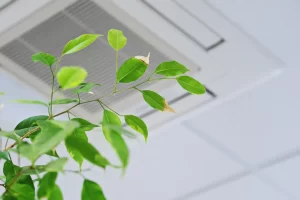
Integrate Standalone Air Purifiers
To achieve better indoor air quality, it is recommended that standalone air purifiers equipped with HEPA filters, carbon filters, UV light, or ozone technology be integrated. These advanced cleaning technologies comprehensively clean the air, capturing a wide range of airborne toxins and volatile organic compounds, thereby significantly enhancing air quality compared to standard air conditioning filters.
Increase Ventilation
Introducing fresh outdoor air through open windows or a ventilation system can help dilute indoor pollutants and improve air quality.
Air conditioners provide comfort by controlling temperature, but they are not air purifiers. Understanding these limitations and utilising additional strategies like HEPA purifiers and proper ventilation can create a healthier and more comfortable indoor environment.
Breathe Easy with SmartWay Air Conditioning: Expert AC Services for Cleaner Indoor Air
At SmartWay Air Conditioning, we offer more than just cooling services. With over 30 years of experience in the air conditioning industry, we provide high-quality services and prioritise customer satisfaction. We specialise in installing, maintaining, cleaning, and repairing various air conditioning systems, ensuring they function optimally to promote better air quality in your home. If you’re concerned about your indoor air quality, SmartWay Air Conditioning is here to help.
We provide expert AC services to ensure that your system runs smoothly and efficiently, promoting better air quality in your home. As the trusted AC specialists in Sydney, we can optimise your AC for better air quality control so you can breathe easily. Request a quote today and breathe easy with SmartWay Air Conditioning!
Maintaining Your Air Conditioner for Better Air Quality
Regular air conditioner maintenance, including efficient air filters, is of utmost importance in ensuring better air quality. This involves cleaning the air conditioner coils and fins, inspecting window seals, and checking the condensate drains. Additionally, it is crucial to keep the area surrounding the outdoor condenser unit clean and free from debris to maintain proper airflow and ensure the efficient functioning of the air conditioning system.
Importance of Regular Filter Cleaning and Replacement
Regular cleaning and replacement of air conditioner filters are crucial to maintaining air quality and system efficiency. It is advisable to replace or clean air conditioner filters every one to three months.
Unclean filters can obstruct airflow, allowing dirt to bypass the filter and damaging the evaporator coil’s heat-absorbing capacity.
The Health Implications of Ignoring Air Quality at Home
Indoor air quality is a significant concern that should not be ignored at home. Poor indoor air quality, often caused by indoor air pollution from sources such as VOCs, dust, mould, and tobacco smoke, can lead to chronic health problems such as respiratory diseases, heart disease, cognitive deficits, and even cancer. Those most at risk are children, the elderly, and individuals with preexisting health conditions.
Indoor air pollutants like allergens, radon, and smoke can contribute to health conditions like asthma and lung cancer. Moreover, ignoring indoor air quality can also result in respiratory issues and impaired infant lung development.
It’s worth noting that improvements in air quality are linked with enhanced lung development in children. As a result, technologies are being developed to measure personal exposure to indoor air pollutants. These technologies can provide individuals and communities with information about daily health risks.
Frequently Asked Questions
How does air conditioning help indoor air quality?
Air conditioning helps indoor air quality by controlling humidity levels and filtering out common pollutants like dust and pollen. However, air conditioners filter pollution through their basic filters, which are less effective against smaller particles like mould spores and smoke.
Do air conditioners bring outdoor air inside?
One of the common air conditioning myths is that air conditioners bring outdoor air inside. In reality, air conditioners actually work by recycling and cooling the existing indoor air rather than pulling in fresh air from outside.
Can air conditioning units harm indoor air quality?
An air conditioning unit can harm indoor air quality if not properly maintained. Dirty filters, clogged ducts, or a lack of regular servicing can lead to poor air circulation, recirculation of stale air, and even mould growth, which can negatively impact indoor air quality.
Should I use an air purifier with my air conditioner?
While air conditioners help indoor air quality by cooling and dehumidifying the air, they are not a complete solution for air purification. An air purifier is recommended to complement your air conditioning unit, as it provides a higher level of air filtration, especially for smaller particles that basic AC filters might miss.
Conclusion
Air conditioners effectively filter out pollutants like dust and pollen, improving indoor air quality. However, compared to dedicated air purifiers with HEPA filters, air conditioners’ filtration capabilities are limited. This is because air conditioners are primarily designed to cool and control humidity levels, with their filtration capabilities being a secondary function.
Standalone air purifiers with advanced technologies like HEPA filters, carbon filters, UV light, and ozone technology are recommended to achieve a higher level of air purification. It is also important to regularly maintain air conditioners, including replacing filters and cleaning ducts, to maintain air quality and system efficiency.
Combining air conditioners with standalone air purifiers and increasing ventilation can significantly improve indoor air quality. This can promote a healthier and more comfortable indoor environment for you and your loved ones.

